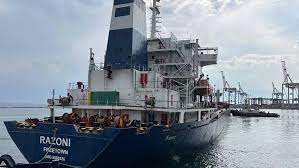An international pact to open the troubled nation’s agricultural exports and help the escalating global food crisis saw the first ship carrying Ukrainian grain set sail from the port of Odesa on Monday.
With nearly 26,000 tons of corn bound for Lebanon, the cargo ship Razoni flying the flag of Sierra Leone sounded her horn as it gently sailed away.
Oleksandr Kubrakov, the minister of infrastructure for the Ukrainian government, posted on Twitter that “the first grain ship since Russian assault has left port.”
On July 22, Russia and Ukraine signed agreements with Turkey and the United Nations in Istanbul, paving the door for Ukraine to export 22 million tons of grain and other agricultural products that had been trapped in Black Sea ports due to Russia’s invasion of Ukraine more than five months earlier. The agreements also let Russia export fertilizer and grain.
Safe passageways through the mined seas outside of Ukraine’s ports were developed as part of the accords.
The rich Black Sea region has long been referred to as Europe’s breadbasket and is a major provider of wheat, barley, corn, and sunflower oil to the rest of the world. Because of the war, food shipments have been delayed, which has increased food prices globally and put developing countries’ hunger and political stability at risk.
In order to stop world hunger, Ukraine is taking a new step today, according to Kubrakov.
The ship’s departure was greeted as “extremely positive” in Moscow by Kremlin spokesperson Dmitry Peskov, who said that it will assist gauge the “effectiveness of the measures that were agreed upon at the talks in Istanbul.”
Teams of representatives from Russia, Ukraine, Turkey, and the United Nations were planning to board the Razoni when it docked in Istanbul on Tuesday afternoon at the Bosporus entrance.
Hulusi Akar, the defense minister of Turkey, warned that the global food crisis could lead to “a serious surge of migration from Africa to Europe and to Turkey” in an interview with the government-run Anadolu Agency.
The destination of the crops, Lebanon, is experiencing a dire financial crisis. In 2020, an explosion at Beirut’s main port completely demolished grain silos and destroyed the capital city. Most of Lebanon’s wheat imports come from Ukraine, but the country also sells corn, which is used to make cooking oil and animal feed.
Other ships, according to Turkey, will also depart from Ukrainian ports along the secure routes. According to Ukrainian authorities, 16 more ships that have been blocked since the commencement of Russia’s invasion of Ukraine on February 24 were waiting for their turn in Odesa.
However, some shipping companies are hesitating to export food across the Black Sea as they evaluate the threat posed by underwater mines and the possibility of Russian rockets striking grain storage facilities and ports.
Especially in the most precarious humanitarian circumstances, the supplies “will bring much-needed stability and assistance to global food security,” according to U.N. Secretary-General Antonio Guterres.
The shipments, according to Kubrakov, will also benefit Ukraine’s war-damaged economy.
He claimed that opening ports would bring in at least $1 billion in foreign cash, as well as allow the agricultural industry to start thinking ahead to the next year.
Olena Vitalievna, a city resident, was happy to hear the ship’s horn blast as it departed the harbor.
“Life finally starts to move forward, and things are changing for the better, “She said. “Since Odesa is a port city, the port should generally live on its own. Our home is here. Everything needs to function for us and be busy.
However, the restart of the grain supplies happened as conflict broke out in other parts of Ukraine, with Russia stepping up its onslaught in the country’s east while Ukraine fought to retake territory in the region that was previously controlled by Russia.
According to the presidential office of Ukraine, throughout the course of the last day, Russian shelling in the Donetsk region resulted in at least three civilian deaths and 16 injuries.
Gov. Pavlo Kyrylenko of Donetsk reiterated a demand for everyone to leave, highlighting the necessity to get the remaining 52,000 youngsters out of the area.
Two persons in Kharkiv were hurt by a Russian strike in the early morning. One was hit while waiting for a bus, and the other was hit when an explosion from a Russian shell happened close to an apartment complex.
According to regional governor Vitaliy Kim, the southern city of Mykolaiv also endured frequent bombardment that destroyed a hospital building and injured ambulances. According to him, three civilians were hurt by Russian shelling elsewhere in the city.
A Russian missile was aimed at Odesa not long after the grain shipping agreement was finalized. Analysts cautioned that the ongoing conflict would possibly jeopardize the grain agreement.
According to Volodymyr Sidenko, a specialist with the Razumkov Center think tank in Kyiv, “the departure of the first vessel doesn’t solve the food problem; it’s only the first step that might possibly be the final if Russia decides to continue attacks in the south.”

















